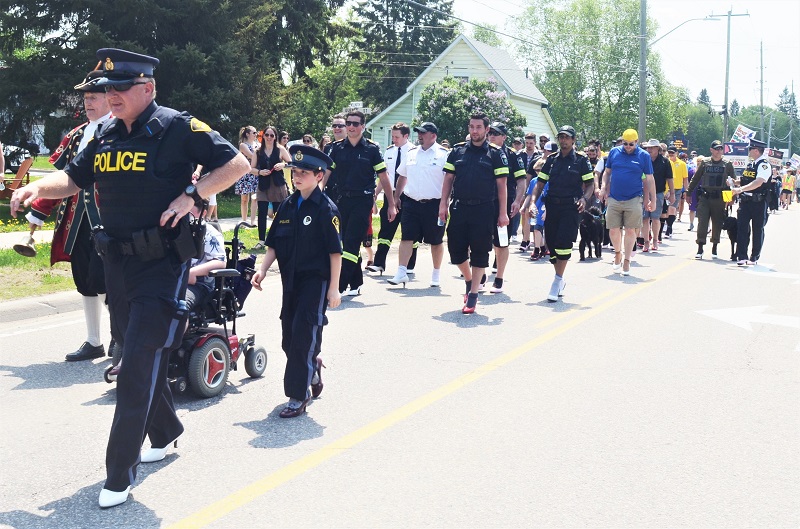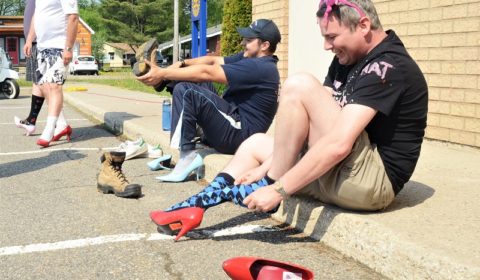Dudes in high heels raise $25,000 to fight violence against women
BRACEBRIDGE — The first thing you notice about the dudes taking part in this year’s annual ‘Walk A Mile in Her Shoes,’ isn’t the hairy legs — but the socks.

Most men wore socks (many wore athletic ones, one presumes to avoid any lasting stigma or sores).
And what socks many wore. They were as colourful as some of the participants, which included police, firefighters, paramedics, Muskoka Victims Services members, dads and dudes in cool – if uncomfortable – stilettos.
According to the YWCA’s Laura Sundy: “We had a very successful Walk a Mile in Her Shoes event Sunday, May 27 – our biggest turnout yet. They walked almost 2K from the Rotary Youth Centre down Wellington Street to the bridge.
“We exceeded our event goals, with over 100 guys walking from across Muskoka and almost $25,000 raised to help put an end to domestic violence in Muskoka.”

Top fundraisers with sponsors were:
Top individual: Bradley Novak
2nd Dean Butterwick
3rd Ed Novak
Top Team: Muskoka Home Builders
2nd Team Novak
3rd Muskoka Victims Services

Funds raised from the event go toward YWCA Muskoka’s violence prevention work, including educational programs and workshops for women and youth, along with the December 6th Fund, which provides interest-free loans for women fleeing domestic violence.
Says Sundy: “If folks missed the event, but would still like to donate, they can do so online at walkamilemuskoka.com until next week.
She adds: “Finally, below find local stats relating to gender-based violence because, as you know, this event really is about educating our community. I’ve also attached our original press release which provides you with an overview of our event.

By the numbers: domestic violence in Muskoka
- Since 2013 YWCA Muskoka has helped 41 women escape domestic violence through our December 6th Fund – an interest free loan program.
- Muskoka Parry Sound Sexual Assault Services’ client load was approximately 165 cases in 2017. Over 90 per cent of those cases had a history of child abuse (serving only women over the age of 16). (Muskoka Sexual Assault Services)
- The number of residents served by Interval House and Chrysalis Shelter for women and children in 2013 was: 129 women and 76 children. The shelters were over capacity on 61 days of the year. (Muskoka Women’s Advocacy Group)
- Muskoka Victim Services says there is an influx of teens being abused in their dating relationships.
- The risk and impact of violence against women in rural communities may be exacerbated due to: (from White Ribbon Canada) o Greater distances from neighbours, social supports (including access to shelters and health care) and programs may further isolate women and families who experience violence;
- o Programs designed to help victims are often understaffed. The rare options that do exist are sometimes located in close proximity to an abuser.
- o “Everyone knows everyone” perception: women in smaller communities may feel uncomfortable discussing experiences of violence, especially in a family context, and men may want to “protect” other men they know from the consequences of perpetrating violence against women;
- o Younger generations may leave the rural community, leaving fewer family members upon whom to rely for support.
- According to the Ministry of the Status of Women, the majority of people affected by gender-based violence are women and children.
- In 2016, Statistics Canada found that slayings committed by past or present intimate partners made up an average of 19 per cent of all solved homicides over the past decade.
- In Canada, a woman is killed every six days as a result of intimate partner violence. On average in Ontario, a woman is murdered by her current/former spouse or another family member approximately every 13 days. Shocking as these statistics are, by March 14 Ontario surpassed both of them. Since Jan. 1 of this year, 15 murders of women, their children and family members have been reported by media (The Toronto Star via Ontario Association of Interval & Transition Houses).
